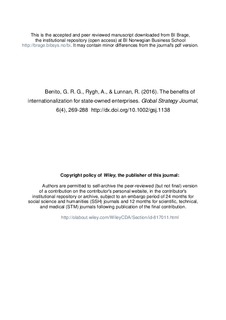The benefits of internationalization for state-owned enterprises
Journal article, Peer reviewed
Permanent lenke
http://hdl.handle.net/11250/2425344Utgivelsesdato
2016Metadata
Vis full innførselSamlinger
- Scientific articles [2173]
Sammendrag
Plain language summary: We investigate whether listed state-owned enterprises (SOEs) benefit more from internationalization than listed private enterprises. We argue that SOEs have a greater scope for benefitting from internationalization due to their previous domestic focus and because of government-related firm-specific advantages they can utilize for their internationalization. In listed SOEs, these factors may matter more than non-economic objectives and corporate governance deficiencies that could reduce SOEs’ economic benefits from internationalization. Empirical analysis on a sample of listed Norwegian firms provides modest support for the hypotheses. There is no indication that state ownership reduces the benefits of internationalization.
Technical summary: We consider state ownership as a moderator of the relationship between internationalization and performance in listed firms, developing theoretical arguments on the scope for benefits from internationalization, corporate governance, and government-related firm-specific advantages. We propose hypotheses on a positive moderation effect from state ownership overall and on more positive effects in majority state-owned enterprises (SOEs) than in minority SOEs, on more positive effects in SOEs previously part of the government administration, and on more positive effects from market-seeking internationalization than from efficiency or resource-seeking internationalization. Panel data analyses considering listed Norwegian firms (2000 to 2010) provide modest support for the hypotheses. Copyright © 2016 Strategic Management Society.
